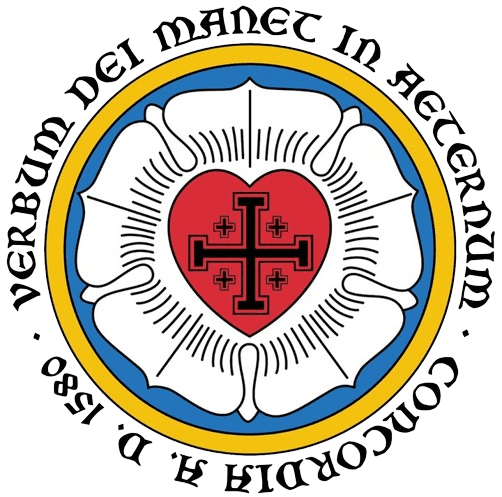The little work which is hereby introduced to the English-speaking portion of our church, is a classic in Lutheran Theology. Its author, Dr. Leonard Hutter, Professor at Wittenberg from 1596 until his death in 1616, was the most prominent theologian of his age. As a teacher, the church owes to him a debt of lasting gratitude for the direction which his instructions gave to the mind of Dr. John Gerhard, the most eminent of Lutheran theologians. As a devotional writer, he published an “Epitome of the Bible,” and “Meditations on the Cross of Christ.”
But it was as an ardent supporter, and zealous champion of our faith, that he was especially distinguished. As such, in his Concordia Concors, he defended the Form of Concord against the Concordia Discors of Hospinian; in his Calvinista Aulico-politicus, contended for Christian liberty, in opposition to the edict of the Elector John Sigismund, which prohibited the teaching of certain Lutheran doctrines within the Electorate of Brandenburg; and in quite a number of books, dissertations, and tracts, attacked and refuted Romanism. His resemblance to Luther in vigor of mind, energy of action, unwearied industry, firmness in faith, and boldness in proclaiming truth and sharply rebuking error, gave to him the title of Lutherus redivivus.
This Compend must not be confounded either with the more extended Loci Theologici, which he afterwards issued, or with the rationalistic Hutterus redivivus of Hase. It was originally prepared as a textbook for the theological schools of Saxony. The Loci Communes of Melanchthon had been almost universally used. But the controversies which previous to the adoption of the Form of Concord had agitated our Lutheran church, rendered such a work necessary as would dwell more fully upon those doctrines of Christian faith, concerning which some of our teachers had erred.
In addition to this defect of the Loci, another objection was urged against it. Whilst the earlier editions so admirably presented the pure doctrine as to gain Luther’s commendation, that “the little book could not be refuted, and it was worthy not only of immortality, but even of canonical authority,” the later issues contained many alterations and additions in conflict with the faith of the church. In a letter to Carlowitz in 1548, Melanchthon acknowledges that he had abandoned the position of Luther in reference to many articles of Christian doctrine, and that especially in the article concerning the Free Will, his present views accorded more nearly with those of Erasmus.* These changes in his doctrinal position he introduced into his Loci, thereby greatly marring its excellency as a text-book for the instruction of the future teachers of the church.
Moved by these considerations, the Elector Christian II, of Saxony, commissioned Dr. Hutter to prepare a Compend of Theology, charging him to use, to as great an extent as possible, the language of the Book of Concord, so that not only the substance, but also the very form of sound words might be taught in the schools. After completion, the work was revised, and approved by the theological faculties of Leipsic and Wittenberg, and was then published in 1609. It was received with great favor throughout the entire church, and for nearly a century was almost universally used in the schools of our church in Germany.
A German translation appeared in the year succeeding its publication; and in the following year, Dr. Hutter himself prepared another translation. We have not before us a list of all the editions which have been published; but from such authorities as we have at hand, we have gathered information concerning twenty-five, the latest of which is that of Twesten, Berlin, 1855. A number of our theologians have made this Compend a basis for other works. Glassius, the greatest of Lutheran philologists of his era, wrote a commentary upon it; so also did Christian Chemnitz, Bechmann, and others.
Werner followed this work, when he prepared his “System of Polemic Theology.” Seyfart prepared “A Logical Anatomy of Hutter’s Compend;” and Heunischius, “An Analytical Epitome” of the same. Moebius wrote quite an extensive volume in defence of it; and Meisner prepared an edition with the Latin and German text in parallel columns. Hulsemann esteemed the study of this Compend as of no less importance than that of the Symbolical Books themselves; and to a reading of it from mere curiosity, Freymiiller ascribed his conversion from Romanism.
This translation has been prepared in order to present to our church in this country an exhibition of pure Lutheran Theology. No work of like character has appeared in the English language, except Gottheil’s translation of Hunnius’ Epitome Credendorum, published some twenty years ago in Germany, but now out of print. The Reformed Church, appreciating her early teachers, has produced translations of Calvin’s Institutes, and the systems of Pictet and Venema; but the Lutheran Church, with doctrinal works of far greater value, possesses them only in a language, which in this country, is read by comparatively few of her ministers, and scarcely any of her laity.
Hutter’s Compend has been selected from among the treasures of our Lutheran dogmatic, because in many respects better adapted to the present state of our church in this country, than any other work. Although it is not a full system of Theology, it cannot fail to give all earnest searchers after truth, a more thorough acquaintance with the faith of our church, and a clearer conception of the System of Theology contained in our Symbolical Books. More can be learned from it than from a mere cursory reading of the Confessions themselves, inasmuch as the subjects are here treated of in a more connected and symmetrical form than in the Symbols, which were prepared at different emergencies, for different purposes, and each of which is in itself distinct and complete.
The translation has been made from the Leipsic edition of 1741, edited by Janus. The German translation of Francke, Halle, 1837, has also been freely used, and has supplied some additional notes from the Symbols, which will be found printed in finer type. The credit for the latter part of the translation, beginning with Article XIV, belongs to Rev. G. F. Spieker; the responsibility for the remainder belongs to us.
Praying that the blessing of God may rest upon this little volume, so that it may aid in diffusing the light of truth, and dissipating the shades of error, we hereby present it to the Evangelical Lutheran Church of America.
H.E.J
Gettysburg,
August 17th, 1868.
*See Buddei Isagoge, p. 346.

